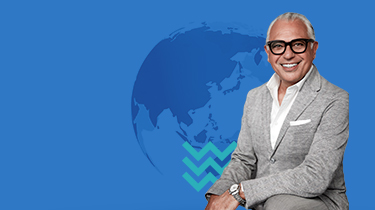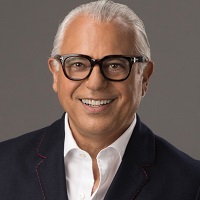
MyEDC gets you the answers you need
Join more than 30,000 Canadians who rely on MyEDC to grow their businesses with confidence.
Oct. 25, 2023

Joe Mimran sits down with Export Development Canada’s Joy Rankothge, EDC’s Chief representative for South Korea. With more than a decade of experience, Joy discusses the challenges and opportunities with doing business in South Korea. With the fourth-largest economy in Asia, South Korea is becoming a destination of interest for Canadian exporters. Joy provides key insights to consider before venturing into this robust region.
Where to listen
Follow us on your favourite streaming platforms to never miss an episode of the Export Impact Podcast. Tune into our podcast for new episodes every second Wednesday at 6 a.m. ET.
Joe Mimran (00:02): Hi, I'm Joe Mimran and welcome back to the Export Impact Podcast where we take you on a thrilling adventure through the world of Canadian exporters and entrepreneurs who are making waves in the international market and who share their stories of their triumphs and challenges. But we don't stop there. We are diving deep into the sea of knowledge and insights from experts in economics and trade so that you have the tools you need to succeed because exporting isn't just about moving goods and services across borders, it's about endless possibilities. In that spirit, today we're going to be speaking with Joy Rankothge, who's the business development lead Asia at E D C. With over a decade of experience in the region under his belt, Joy has been a driving force in the world of trade and business development and he knows a lot about the risks and rewards of doing business in Asia and in South Korea in particular.
I'd like to begin today's episode by acknowledging that we're recording from my office in Toronto, which is on the traditional unceded territory of many nations, including the Mississaugas of the Credit, the Anishnabeg, the Chippewa, the Haudenosaunee, and the Wendat peoples, and is now home to many diverse First Nations, Inuit and Metis people. We value taking this moment to deepen the appreciation of our indigenous communities wherever we are, and to remind ourselves of our shared debt to Canada's first peoples.
It's an absolute pleasure to have you on the show. We're about to embark on an epic journey through the realm of Asian markets and South Korea's secret treasures. But before we set sale, let's get to know the man behind the expertise. Can you tell us a little bit about yourself and your role as EDC's business development lead in Asia?
Joy Rankothge (01:57): So yeah, my name is Joy Rankothge. The business development lead role is actually gonna expire as I move into South Korea as the new chief representative in South Korea, based in Seoul. The business development role was more to develop the strategy for EDCs Indo Pacific strategy. I was leading that based out of Singapore and I'll be moving to Seoul. I've been with EDCs now for about 10 years, always focused on the broader Asia Pacific region, focused on risk for a while, which is development roles. I've had a stint in trying to run my own business pre-Covid, quite proud of the starting up my own business and then kind hit some challenges when Covid came around and looking forward to this new opportunity in South Korea where I think there's tremendous opportunity for Canadian companies to explore.
Joe Mimran (02:49): So when you went out on your own to do your own business, did you do that so you would have a little more empathy for all the people you're trying to help?
Joy Rankothge (02:58): I always had tremendous respect for entrepreneurs and you hear that the challenges in starting a business and being your own boss, but sometimes you see only the glamor of that, but not the real hard great work that's required. So I think I take it as a good way to have gone through that experience a little bit. The joys and challenges of winning your first contract, I mean that is such an amazing feeling to say, okay, you know what? My company, we signed our first deal. That I think is one of the highlights of my professional life, was having that opportunity. So I hope that experience helps me stay true to helping Canadian companies. So yes, it was a good experience.
Joe Mimran (03:40): Yeah, I'm sure it will. It's always great to feel the hardships that some entrepreneurs go through. But now that you're back at E D C and you're moving from Singapore, you've mentioned to South Korea, does your role change at all when you go from being in Singapore to being focused just on South Korea? Does the job function change?
Joy Rankothge (04:02): I was a chief rep of Southeast Asia looking at all of the Southeast Asian region and doing the same role that I will be doing in South Korea. In the interim, I was the business development lead looking at the strategies, but the chief rep role is more of an execution role. So you take the strategy and then you start executing it. I've been in that role before the execution role as chief rep Southeast Asia as I mentioned so that's the biggest change. And South Korea is a new market for us. I mean this is the first time that E D C is opening up a representation. Our business model is at this point we have 20 regional representation offices and we co-locate within the Canadian embassy or Canadian mission. Singapore is unique, it's our standalone branch we set up seven years ago where we do some of the underwriting. So what that means is we can actually do the transactions on the financing side in Singapore. So in Korea will be a representation at the mission. So I will not do the underwriting, we'll hub it back into Singapore. So working closely with my Singapore colleagues. So having been in Singapore, going to South Korea, that's gonna help because the networks are there in Singapore.
Joe Mimran (05:11): And South Korea, I mean, it's an incredible market, holds immense potential. Perhaps you can elaborate on why it's such an attractive market for Canadian businesses and what unique opportunities it offers compared to other Asian countries?
Joy Rankothge (05:27): So I mean if you take it from a very big picture level, South Korea is the fourth largest Asia-Pac economy and the 10th largest globally. And what that means is, you know, having the largest economy, South Korea is a developed economy. It's not a developing economy. It's developed so that means higher incomes and incomes very similar to Canadian incomes. And what that means is purchasing power wise, they can consume similar goods and services as in Canada from a price standpoint. Compared to some of the other markets, it's not a price on certain areas, it's not a very price-sensitive market. South Korea offers tremendous export potential business activity for Canadian companies, I think in a number of areas at a high level the premium market. But they then also we have a Canada South Korea have the only pre-trade agreement between bilateral free-trade agreement in the Asia-PAC region. We have the C P T P regional agreement with number of oceanic countries, but this is the only bilateral meaning only between two countries.
So that came into force in 2015 and since then we've seen exports almost double. So I think the tariffs will even go to 0% in the coming years in certain sectors that'll allow even more free access for Canadian companies. The last point I'll add there is, so E D C does this survey, which we call the trade confidence survey, where we go out to Canadian companies and ask about the intentions where they want to go expand. And South Korea has come up consistently in the last few years as a top 10 market that Canadian companies want to explore. And we are seeing that in that survey data and also anecdotally through our customers wanting to explore more opportunities; talking with our team Canada partners, we hear that as well, more and more activity, more interest in the market.
And then the last point is Canada and South Korea have had a strong bilateral relationship. We're marking 60 years of strong relationships between our two countries and there's been a lot of government-to-government engagement over the last little while at a very strategic level. And 2022 there was a comprehensive strategic partnership that was signed for cooperation in a number of areas, including certain elements of trade as well. The stars are lined up right now. We have a window of opportunity for Canadian companies, I think to strike and unleash the opportunity in the market.
Joe Mimran (07:54): Yes, I've seen South Korea develop over the years I was there in the early eighties and then did business there for so many years. And it's remarkable how it has evolved as a country. And you go there now and it's like Blade Runner, it's so advanced. It's really quite fascinating to see. And I guess the question is how do we leverage the free trade agreement? How do we leverage the green new deal that seems to be a pretty big aspect for South Korea, right?
Joy Rankothge (08:23): That's right. So I think from a sectoral standpoint as part of EDC Indo-Pacific strategy, there are a couple of sectors we are focusing on and Cleantech is one of those sectors where Canada has a lot to offer. For South Korea's new green deal, there are targets of achieving net zero as well as increasing renewable energy. So offshore wind, solar, and then some very innovative areas like hydrogen carbon capture and storage; areas that Canada has technical excellence in these sectors. And South Korean companies the South Korean government have noticed that's one of the reasons why we have a strategic partnership between our governments and then industry as well. If you check the news reports in the last little while, you would've seen a number of announcements of South Korean entities looking at investing in Canada to harness some of the resources we have to support the green transition into EV batteries.
South Korea knows how to produce the batteries. Outside of China, they're one of the leading players in the EV battery space. Hydrogen, there's huge demand. Hydrogen technologies from South Korean companies. Again, we have those resources and best opportunity for South Korean companies to come invest in Canada, create good jobs for Canadians, and then supply those into the US and other markets and also be part of the green transition. So I think the opportunity is quite big on the green sustainability side. So first question on how do we unlock this? How do we go about this? What our surveys have shown and when we talk to our potential customers, one thing we hear not only South Korea I think in general is Canadian companies, they know there's opportunity out there in general terms, but then the specificities of how do we go into this particular sector? What are the entry barriers, what are the rules? They're looking for that very specific knowledge.
What are the companies we need to talk to, the networks we need to untap. I think getting that information in front of Canadian companies who are serious about entering this market, I think that's one. And then making sure we get that to the right Canadian companies who are interested. Because at the end of the day, many markets in Asia, there's opportunity there, but then not everyone can participate. I think you need to have a certain level of capacity, financial and otherwise to enter into these markets and for example, financial capacity to take a long run because these are relationship-based economies where you need to spend time building relationships. And that means investing time and capacity upfront, getting to know your customers, your potential customers. So yeah, I think knowledge and then just getting into the right people and then making those connections, that's something that we would want to.
Joe Mimran (11:10): Do you think that this relationship-based approach you think that's unique to the Indo-Pacific area?
Joy Rankothge (11:16): It's an interesting question. I think it's prevalent in some other regions as well, but I think it's more intense. The need of relationships or relationship-based business culture is more pronounced in the Pacific region and more so in some particular countries. For example, in a place like Singapore, not that relationships don't matter, they do matter but I think Singapore is more of a very cosmopolitan, very open economy where from all over coming in to do business places like South Korea where it's predominantly homogeneously Korean driven, the economy is very Korean driven. The business culture, the business entities are very Korean. You've got to develop the networks as an outsider to be considered serious. And that could mean spending time putting down boots on the ground. And that's what we are doing as well. To be taken serious, you've gotta make those commitments financial and otherwise to show that you're serious.
Joe Mimran (12:13): Yes, Japan and South Korea have similar profiles in my mind. They feel similar in that you have that additional layer of relationship that you have to develop and also because they have a somewhat different system, don't they? The chaebols, which is so prevalent in Korea and the importance of some of those giant South Korean business companies, they're like superheroes of the economy, right? You've gotta know how to deal with them and what that means. And I would think E D C could provide so much help with respect to who to talk to, how to navigate that cause that is very different than some cultures, which is very transactional in nature.
Joy Rankothge (12:53): Exactly. Depending on the estimate, anywhere between 60 to 70% of the G D P of South Korea is dominated by what you call chaebols, which are conglomerates, essentially. We can spend another podcast talking about the history behind and has a very interesting history behind why they were created. They're still dominant players in the economy, but there's been a lot of reform over the last, I would say 15, 20 years to allow more non-chaebols to participate in the economy. So there's ongoing reforms, but yes, we've got to, as a company looking at South Korea, that's a very good entry point. And then you've gotta figure out what's the value exchange you want to have, what are you bringing to the table, and then what are you gonna receive in return? And having a clear understanding of what are the trade-offs you wanna make as well. You have to take your A-game into having these negotiations. Don't skimp out on a law firm. Gotta find a good lawyer to negotiate those prices and contracts.
Joe Mimran (13:50): So when you think about the challenges then, what are the main challenges? Yeah, there's cultural issues, there's all of the different things. How would you rate them in terms of the challenges?
Joy Rankothge (14:02): I'd say the challenges would be number one I think is the business environment and understand navigating that network business culture and having the right partners. So it's not only E D C, I mean definitely one of the goals of us setting up the office is to get to know some of these conglomerates and key players in market, including Canadian companies who are doing business. So get to know the folks in market, get to know an ecosystem of players, and then make the right connections so you start developing your networks and can make those bridges. And then like I said, not only E D C, but Team Canada. And what we mean by that is there's the trade commissioner service there. They have a very large team and many of their trade commissioners have been doing this, have deep expertise, they're locally engaged Korean nationals who speak the language, who can make introductions, et cetera.
So that's one layer. The provinces, Ontario, British Columbia, Quebec, Alberta, they're all present in market with teams on the ground. So they can give you knowledge, make network connections. And there are other federal partners also looking at facilitating trade. So these are all entities that can support you on the networks and knowledge. I think the other challenges are very sector-specific, but you know, I'll make some generalizations. Korea is very dynamic, as you mentioned earlier. It's blade runner, it's very innovative, cutting-edge economy. Consumer tastes are changing very rapidly. They're setting the trends in Asia and globally. I mean Netflix, K-pop, all of that is being driven by Korean consumer demand and it changes very rapidly. So if you are getting into the Korean B2C market, can you adapt very quickly and not everybody can do that, but if you can, then it's not only the Korean market that you're gonna capture, but the rest of the Asian market as well. Because Korean consumer trends now are huge in Singapore or in Southeast Asia, Indonesia, Korean food companies. So if you can crack the Korean food market, let's say in alternate proteins and work with a Korean producer to go distribute that into Indonesia, then not only are you getting South Korea's access, but you know potentially Indonesia access. So I think that's double-edged in the sense if you can figure out a way to crack it, then that gives you an opportunity. Related to that is scale. Can you scale up it's 50 million population?
Joe Mimran (16:27): So I'm interested. Having a fashion background, it's always interesting to understand how Korea became the trendsetter for that region. What do you think? I mean it used to be Japan was where you would go for direction in my industry. And then over the last five, 10 years, South Korea has taken that role on. They're leading in so many areas and as we get into this a little more real-life examples provides valuable insights for us. Can you share a success story of a Canadian business that's ventured into the South Korean market? What lessons were learned from their experience?
Joy Rankothge (17:07): I can share some names of Canadian companies present in South Korea right now. So WSSP for example, it's an E P C M, engineering, procurement and environmental services company that continues to be present in South Korea. Then when we go into the consumer side, there's Canada Goose. If you remember one of the points I was making earlier was South Korea is a developed economy. So higher purchasing power, very similar to Canada. That means that you have consumers who can purchase things that are premium quality. There are Canadian companies successful in cherries, blueberries, lobster, seafood, Canadian seafood is considered premium. And then there are niche players that are doing well. As I was doing my research on South Korea and talking to people, we think as Canadians don't have much to offer South Korea because they're so advanced in technology. But I think we underestimate the niche innovation that's happening in Canada and these large companies wanting what we have.
Joe Mimran (18:06): Yeah, fantastic. It's always inspiring to hear Canadian success stories and what they've done to get there. I'd love to switch gears a little bit and talk a little bit about some of the cultural tips or best practices that you would be familiar with. And you talk a lot about relationship base, but what do you do specifically to build those relationships? Is it dinners, is it face-to-face meetings? I mean, how do you really build those relationships?
Joy Rankothge (18:36): So this is a business culture where I think a warm introduction; it's not a cold call introduction business culture. You want to get a warm introduction from a Canadian, we'd be happy to do that. If you have the connection of one of our Team Canada partners, you want to get introduced into the local company versus a call. So that's one. Then the relationship building, yes, that'll take time. I think the pandemic allowed for virtual connections. I think that's definitely more receptivity. So for example, we started an engagement with a Korean entity on opportunity. It was all virtual. I did my interactions in Singapore, but then we had the opportunity to meet in Singapore because they were doing some travel. I think that helped move things forward. So if you get an opportunity, if you can make it, I think the face-to-face definitely goes a long way. And then it's a culture of dinner and meeting our food and drink. I think that the kind of definitely builds up rapport. It will take some time, it's not a transactional society.
Joe Mimran (19:37): How about the language issue with Korea?
Joy Rankothge (19:39): Good point. You will need a local interlocutor, whether it's a trusted partner, a trusted service provider, a local partner. There will be people who understand English, no question. But I think to have deeper conversations, complicated conversations, you want to have the local knowledge, local language capabilities on your side to have that conversation.
Joe Mimran (20:01): As we're coming to the end of our time, Joy, I wanna turn to your final piece of wisdom. What advice do you have for our courageous Canadian entrepreneurs as they embark on their South Korean Odyssey?
Joy Rankothge (20:13): I'd say, I think right now we have a golden opportunity window where, at the government levels, there's a lot of synergy of cooperation, collaboration. We have Korea's attention at the highest level and I think across media, across society. So it is the right time to try to A, if you don't know about the opportunity, start at that very end. Get to know the market, get to know the opportunity, do some research and we can help you in Canada, partners can help you. And if you're further down the road, seriously think about the market entry, go-to market strategies that you have. And then lastly, I would say is the network. So let's say start building the network virtually, if that's what it is, and then think about visiting and shaking a hand and enjoying a meal.
Joe Mimran (21:04): Joy, thank you for joining us today and sharing your tales of triumphs and strategies for success in the South Korean market. I'm sure with your guidance and EDC support, I have no doubt that Canadian businesses will conquer new frontiers and leave their mark on the world stage. We wish you all the best in your new role and we look forward to following your journey.
Joy Rankothge (21:27): Thank you very much, Sir.
Joe Mimran (21:29): And to our incredible listeners, remember with a touch of daring, a sprinkle of innovation, and the right support, you have the power to unlock limitless opportunities in the global marketplace. Thanks for joining us today on the Export Impact Podcast. If you enjoyed today's episode, we'd love for you to subscribe, rate, and leave us a review on your favorite streaming platform. See you back here in two weeks.

Guest
Chief representative, South Korea, Export Development Canada

Host
CEO of Joseph Mimran & Associates Inc., founder of Club Monaco & Joe Fresh, and former Dragon on CBC’s Dragons’ Den

Join more than 30,000 Canadians who rely on MyEDC to grow their businesses with confidence.

Insights and analysis from EDC to help plan your global expansion in the Indo-Pacific and Asia.

Our unique suite of solutions can help you offset the risks of doing business abroad, finance your deal, and access the working capital you need.